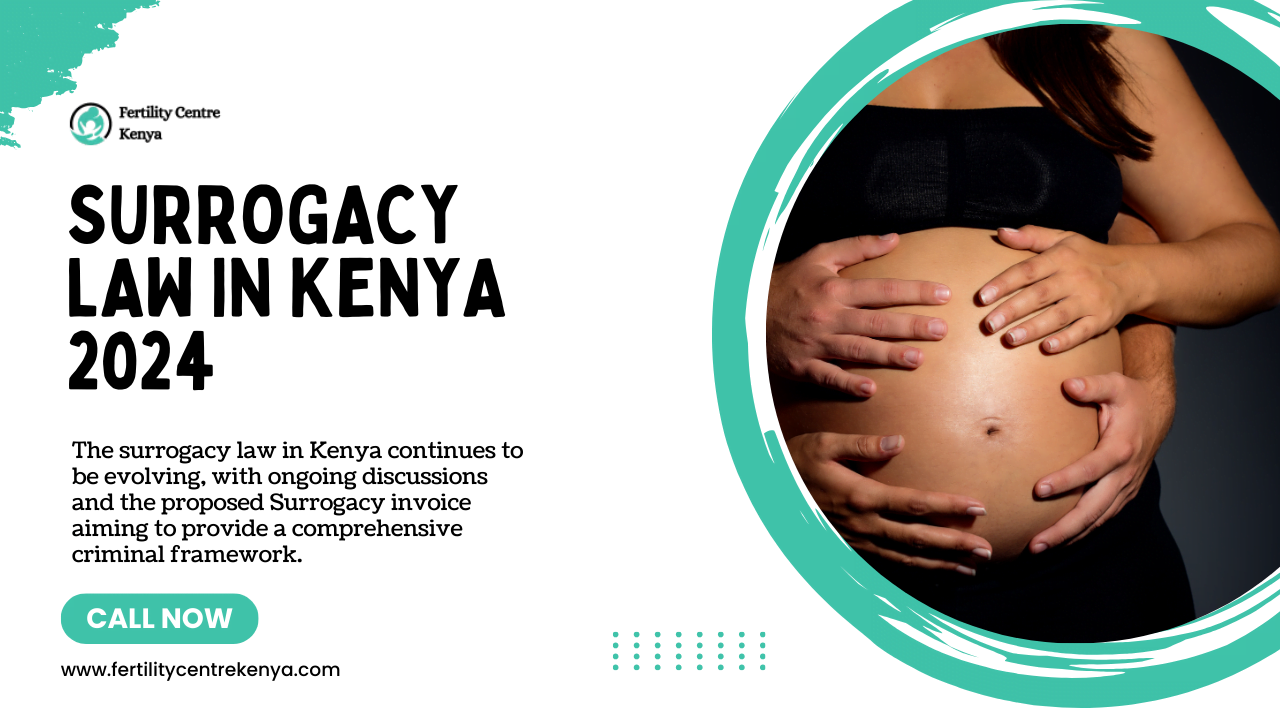
Surrogacy, a technique of assisted reproduction, has won massive interest in recent years as a feasible alternative for individuals and couples who are unable to conceive or carry a pregnancy themselves. While considering surrogacy as an option, it is crucial to understand the prison framework surrounding this practice inside the selected USA. In this text, we can explore the surrogacy law in Kenya, dropping light on the legal elements, rules, and rights involved.
Surrogacy is often deemed unaffordable in nicely-advanced nations just like the US and the UK because of excessive costs. Whilst a few nations have felony regulations on surrogacy, Kenya sticks out as a district that is remarkably open to this method. Fantastically, there may be no particular Surrogacy regulation in Kenya, demonstrating the government’s reputation for the method’s significance in assisting infertile couples to understand their goals of starting a family.
Kenya has become a preferred destination for couples from well-developed nations, primarily due to the comparatively lower cost of surrogacy and the higher success rates of bringing home a baby. This trend has significantly boosted Kenya’s reputation as a leading surrogacy destination, and the increasing number of successful cases each year is a source of great pride for the country.
The government’s lenient stance on surrogacy in Kenya reflects an understanding of the immense value it holds in providing medical assistance to infertile couples who are unable to conceive naturally. By not imposing legal restrictions, Kenya enables couples from around the world to access surrogacy services, fostering hope and happiness as they complete their families.
An Overview of the Legal Landscape: Understanding Surrogacy Laws
As of the time of writing, Kenya does now not have unique regulations totally addressing surrogacy. The felony framework surrounding surrogacy in Kenya is derived from diverse belongings, along with the charter, common law requirements, and statutory provisions associated with adoption and guardianship.
Whilst surrogacy isn’t always explicitly prohibited in Kenya, there may be no complete regulation governing surrogacy arrangements, leaving a prison gray area that poses disturbing conditions for all events involved.
Legal Precedents and Judicial Guidance: Navigating Surrogacy through Guidelines and Court Rulings
Inside the absence of precise legislation, the high courtroom of Kenya has supplied guidance and rulings on surrogacy topics. In 2014, the high courtroom issued tips that allow for altruistic surrogacy preparations, whereby the surrogate mother no longer obtains monetary compensation beyond repayment for medical and related expenses. These guidelines set sure necessities and safeguards to protect the pastimes of all events involved, which include the supposed mother and father, surrogate mom, and infant.
However, it is important to note that these guidelines are not legally binding and are subject to interpretation. The lack of clear statutory provisions often results in inconsistencies and uncertainties in the implementation and enforcement of surrogacy agreements.

Navigating Challenges and Addressing Concerns: Surrogacy Considerations
The absence of comprehensive legislation poses various challenges and concerns regarding surrogacy in Kenya. These include:
Lack of Legal Certainty: The absence of clear laws governing surrogacy leaves each intended dad and mom and surrogate mothers in a legal gray location, main to uncertainties and capacity disputes.
Parentage and Citizenship: determining legal parentage and citizenship of the child born thru surrogacy can be complex without precise legal provisions, creating headaches associated with documentation and tour.
Commercial Surrogacy: The absence of rules permits the ability exploitation of surrogates and raises moral concerns related to industrial surrogacy preparations.
Rights and Protections: The legal gaps make it challenging to establish clear rights and protections for all parties involved, including the child’s welfare and the surrogate mother’s well-being.
Advancing Surrogacy: The Pathway of the Proposed Surrogacy Bill
To deal with the prison gaps and offer a complete regulatory framework, a Surrogacy bill has been proposed in Kenya. The bill targets to adjust each altruistic and industrial surrogacy, ensuring the protection of the rights and pursuits of all parties worried.
The proposed Surrogacy Bill includes provisions for:
- Eligibility criteria for intended parents and surrogate mothers.
- Legal recognition of surrogacy agreements.
- Rights, responsibilities, and compensation for surrogate mothers.
- Parentage, citizenship, and documentation of children born through surrogacy.
- Establishment of a Surrogacy Board to oversee and regulate surrogacy practices.
- Ethical guidelines and safeguards to prevent exploitation and ensure the well-being of all parties involved.

Advantages of Surrogacy in Kenya: A Pathway to Parenthood
Surrogacy has emerged as a promising option for individuals and couples facing infertility or other medical challenges on their journey to parenthood. Among the various destinations offering surrogacy services, Kenya stands out as a favorable choice. With its unique advantages and strengths, surrogacy in Kenya presents a range of benefits for intended parents.
Affordability: Surrogacy in Kenya gives a greater value-powerful choice as compared to properly-developed nations. The prices related to surrogacy, along with clinical strategies, reimbursement for the surrogate mother, and legal formalities, have a tendency to be pretty decrease, making it an extra available and low-cost choice for people and couples in search of assisted replicas.
Legal Permissibility: While some countries have restrictive or ambiguous surrogacy laws, Kenya provides a favorable legal environment. With no specific surrogacy legislation in place, Kenya demonstrates a lenient approach, enabling intended parents to pursue surrogacy arrangements without facing legal obstacles or uncertainties.
High Success Rates: Kenya has won recognition for its excessive achievement rates in assisted reproductive technology, such as surrogacy. Fertility clinics and specialists within the USA own the knowledge and advanced clinical centers to ensure the surest consequences, increasing the probability of success being pregnant and the birth of a healthy baby.
Availability of Surrogate Mothers: Kenya offers a pool of compassionate and willing surrogate mothers. Many women in Kenya are open to becoming surrogates, driven by their desire to help others fulfill their dreams of having a child. The availability of surrogate mothers ensures that intended parents have a range of options and can find a suitable match to embark on their surrogacy journey.
Cultural Compatibility and Support: Kenya is known for its warm hospitality and cultural diversity. Intended parents from different backgrounds can find comfort in the inclusive and welcoming nature of the country. The cultural compatibility and support from the local community can enhance the overall experience of the surrogacy journey, fostering a sense of belonging and acceptance.
Ethical Considerations: Surrogacy in Kenya emphasizes ethical practices and safeguards the well-being and rights of all parties involved. Fertility clinics adhere to international guidelines, ensuring that the surrogate mother is well-informed, protected, and receives appropriate medical care throughout the process. Ethical considerations are given utmost importance, providing peace of mind to intended parents.
Conclusion
The surrogacy law in Kenya continues to be evolving, with ongoing discussions and the proposed Surrogacy invoice aiming to provide a comprehensive criminal framework. Whilst the absence of precise legislation poses demanding situations and uncertainties, it’s miles vital to take into account the rights and properly-being of all parties involved in surrogacy arrangements. Clean and comprehensive laws can provide the steering, protect the pastimes of intended parents and surrogate moms, and make certain the first-class pastimes of the kid born thru surrogacy.
It is crucial for stakeholders, including legislators, legal experts, healthcare professionals, and the public, to engage in meaningful discussions to shape surrogacy laws that balance the rights and responsibilities of all parties involved. By addressing the legal gaps and establishing a robust regulatory framework, Kenya can pave the way for safe, ethical, and well-regulated surrogacy practices.
FAQ:
Q1: What is the legal status of surrogacy in Kenya?
Surrogacy is not regulated by any specific law in Kenya. As a result, there is no clear legal framework governing surrogacy arrangements in the country.
Q2: Is commercial surrogacy allowed in Kenya?
No, commercial surrogacy is not allowed in Kenya. The country does not permit surrogacy arrangements where the surrogate mother receives financial compensation beyond the reimbursement of reasonable expenses.
Q3: Can same-sex couples pursue surrogacy in Kenya?
Yes, same-sex couples can pursue surrogacy in Kenya. However, they may face societal challenges and the lack of legal protections specific to same-sex surrogacy
Q4: Are there any eligibility requirements for intended parents in Kenya?
There are no specific legal eligibility requirements for intended parents in Kenya. However, individual surrogacy agencies or clinics may have their own criteria that the intended parents must meet
Read Also:
- Exploring Surrogacy Cost in Ghana 2023: A Comprehensive Guide to Fertility Centers in Kenya
- Top 5 Best Surrogacy Centre in Kenya 2023 With Success Rates
- Guaranteed Surrogacy in Kenya 2023: A Land of Hope at Fertility Centre Kenya?
- How much does Gay Surrogacy Cost in Kenya?
- HOW MUCH DOES IVF COST IN NAIROBI IN 2023?

